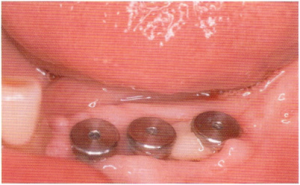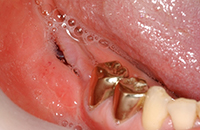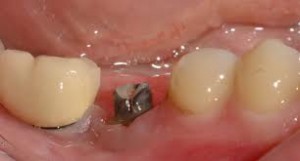Complications after dental implants

After implantation, various unpleasant consequences can occur.
But it is worth noting that complications in dental implants are extremely rare, because at present the technology of implant implantation has been worked out quite well.
Complications after dental implants can occur during the first days or months, but can be late and occur two to three years later.
Problems dental implants are possible for some reasons:
- In connection with the characteristics of the patient’s body.
- Conducting a superficial examination, improper diagnosis, insufficient identification of indications and contraindications for surgical intervention.
- Violation of the technology of implantation, associated, most often, with insufficient experience of the implantologist.
- Non-compliance by the patient with the recommendations of the doctor in the postoperative period.
Early complications
Pain
Pain syndrome is inevitable and begins after the end of the action of anesthesia.
- The norm is the presence of pain within two to three days after the operation.
- During this period, it is recommended that you take pain medications prescribed by your doctor.
- If the duration of the pain is delayed, then this may indicate the presence of an inflammatory process or trauma to the nerve.
Edema

- This is a natural reaction of the body to tissue damage.
- It does not appear immediately, but after two to three hours after the start of the surgical intervention and after five to seven days it completely disappears.
- Timely application of ice to the site of surgery helps to reduce puffiness.
- If swelling does not go away after seven days after implantation, we can assume the onset of the inflammatory process of soft tissues.
Bleeding
The presence of slight bleeding in the early days is a normal condition. Bleeding may be associated with patients taking anti-clotting drugs.
If the bleeding on the first day after implantation is intense enough or does not stop ten days after it, then this indicates vascular injury and the risk of hematomas.
A hematoma occurs with prolonged bleeding, the outcome of the formation of a hematoma may be suppuration of the postoperative wound, as well as the divergence of sutures.
Temperature rise
- Elevated temperature is the body's natural response to surgery and implant placement.
- If the body temperature is 37 ° C and lasts no more than three days, then this is a normal situation.
- If the temperature does not drop, then this may indicate the onset of the inflammatory process.
Seams
May occur due to:
- Incorrect stitching.
- Mechanical damage.
- With the development of the inflammatory process.
Numbness
It is observed within three to five hours after implantation and is the result of local anesthesia.
- If after five hours the feeling of numbness persists, then this condition may indicate trauma to the nerves.
- This is typical only for the lower jaw, due to the fact that the facial nerve passes here.
- Nerve healing takes a fairly long time, which takes several months.
Inflammation
The inflammatory process of the soft tissues surrounding the jaw may develop.
The negative effects of dental implants are also possible during implant engraftment.
The most serious side effects

- Reimplantitis
- Implant rejection.
Reimplantitis is an inflammation of the bone tissue surrounding the implant.
Causes of Reimplantitis:
- Damage to the wall of the paranasal sinus.
- Hemorrhage over the plug with further suppuration.
- Incorrect closure of the postoperative wound.
- Inaccurate bone bed preparation technique.
- Inflammation of an adjacent tooth.
- Inaccuracy in the manufacture of crowns.
- Non-observance of personal hygiene by the patient.
Implant rejection - rejection of a titanium rod by bone tissue.

Reasons for rejection:
- Reimplantitis
- Bone deficiency.
- Surgical trauma.
- Exacerbation of chronic diseases.
- Allergic reaction to titanium.
- Smoking.
- Thermal bone damage.
- Osteoporosis of the jawbone.
Exposure of the implant - does not apply to serious complications, but has a negative effect on aesthetics.
The most common cause of exposure of the implant is improper formation of gingival flap tension.
Video: “Complications of dental implants”
How to avoid complications
- It is necessary to carefully choose a clinic.
- To study reviews of real patients of clinics.
- Strict adherence to doctor's recommendations after implant placement.
Clinical case
- The patient had an implant placed on the upper jaw. During screwing, he fell into the depths of the bone. The dentist assured that this is not scary and everything will grow. After the operation, the patient did not have pain and he turned to another dentist. After an X-ray examination, it became clear that the implant protrudes significantly into the maxillary sinus cavity. The doctor’s opinion is the removal of an implant. Three months later, the patient underwent bone growth and the implant was reinstalled. The reason for the complication is that the dentist who performed the implantation did not correctly assess the thickness of the bone tissue.
- A patient came to the clinic who installed BOL plate implants a year ago. Complaints boiled down to the fact that all implants were staggering. The dentist made a decision: to remove the implants, make bone extensions, and then install new implants. The implant removal process has damaged the jawbone. As a result, two operations were performed to build bone tissue, then new titanium rods were installed. As a result, the treatment lasted long enough: more than nine months, the patient was exhausted and the treatment cost her much more than was planned. Such consequences may result in attempts to save on the procedure.
- The patient had an implant installed, the bone thickness was sufficient for the procedure, and everything was going fine. Five months after implantation, the implant turned over during the installation of a permanent dental crown, which is not the norm. It became clear that the implant engraftment was not completed. The dentist had to make a choice: removal of the implant and the whole process to start over or leave the implant. The doctor decided to leave the rod and installed a crown on it, warning the patient about the possibility of an adverse outcome and, if necessary, the need to consult a doctor. For the past three years, the patient has not complained, the implant has taken root.
- The implant was installed so that the shaft damaged the root of the adjacent tooth. As a result, it was necessary to reinstall the implant and remove the damaged tooth. This is an example of a medical error.
Reviews
- Six implants were placed on my upper jaw. After the operation, everything was fine. A temporary removable silicone prosthesis was installed. He periodically rubbed the mucous membrane in the place where the implant was installed. At the site of the implant there was pain, redness of the mucosa.
- Two years ago I had an implant. It was not painful either during the installation, because the operation was performed under anesthesia, and after installation. The pain passed on the second day. There was a little swelling. I applied cold.
- Installed the implant. The operation was painless and very quick. The next day, hell pain started in the evening. They took a picture, it turned out that next to the implant a millimeter from it is the root of a healthy tooth. They removed the nerve from this tooth, but the pain still didn’t go away. And now I don’t know whether it should be so, or whether it’s a medical error.
- From two sides at the top, she implanted sixes. The operation lasted an hour and went well. In the first three days, there was severe swelling, the temperature of the body rose, the stitches were bleeding, I could not open my mouth. On the fourth day it became easier. This is actually a long process.
- Three months ago, he implanted two teeth of the lower jaw on the right. Ten days later, the rods were removed due to numbness. After repeated implantation, numbness started again. The dentist said that everything is fine, just the nerve is pinched by a hematoma.